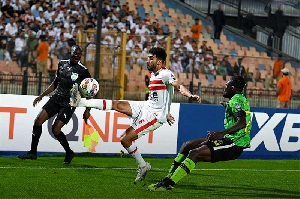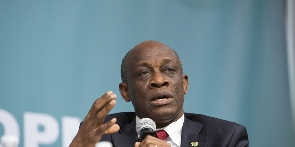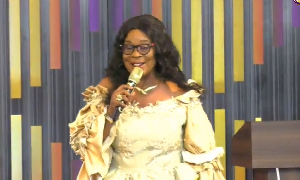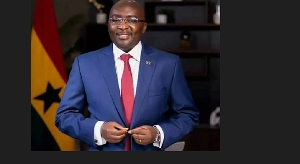- Home - News
- TWI News | TV
- Polls
- Year In Review
- News Archive
- Crime & Punishment
- Politics
- Regional
- Editorial
- Health
- Ghanaians Abroad
- Tabloid
- Africa
- Religion
- Election 2020
- Coronavirus
- News Videos | TV
- Photo Archives
- News Headlines
- Press Release
Opinions of Sunday, 15 October 2006
Columnist: Sheriff, Yakubu Adams
Ghana's Development & Irresponsible Journalism II
In 1979 while preparations were underway to usher Dr Hilla Limann into office, students who were at the forefront of the AFRC revolution that overthrew the SMC regime went on the streets clamouring for “more blood to flow”. According to Kevin Shillington ( Author; Ghana And The Rawlings Factor), Rawlings was caught in an awkward position in that the “salvation of the officer corps as a whole depended on the flow of more blood in order to appease the anger” . And to make matters worse, “…there were rumours in Accra that Rawlings would be removed if he tried to stem the flow of “people’s justice”” . So uncontrollable and volatile was the situation that no one could stick out his neck to control the anger of the students. But one person single-handedly spoke against the students and that was Elizabeth Ohene who was then a literary Editor of the Graphic. In an article she published, she condemned the macabre slogan of the time” let the blood flow”. She succinctly argued that any further executions will further aggravate the situation and brutalise the general citizenry. The reaction of the students was swift. They invaded the premises of the Graphic in Accra and demanded “Death to Ohene” .
Elizabeth Ohene did two impressive things at the time (as a journalist). Not only did she stand against the irrational behaviour of the students of the time, she also declined an offer of a promotion by Rawlings to the position of the editor of the Graphic on grounds of asserting the independence of the press as required by the constitution. Remember Rawlings made that offer to her because of her display of extra ordinary sense of heroism . That was quite impressive as far as I am concerned. And that is the type of journalism we expect from our “professional” journalists; to stand by their convictions even in the face of hostility.
Journalism in Ghana makes different manifestations. Almost on a daily basis we are bombarded with parachute journalism on our airwaves. By that I mean the practice of reporting especially on radio by inexperienced journalists on subjects which they obviously have little or no knowledge. The resultant effect is that the general public is fed with inaccurate or distorted news or reports. A typical example is what happens on our radios almost on a daily basis. The general public is constantly being fed with inaccurate and unsubstantiated stories by journalists who know next to nothing about their subjects. Sometimes they give us the impression that they have not taken the pain to read around their subject before dashing to the studio. The sad situation is that some of these hosts try as hard as they can to convince us that their imaginations are indeed facts. And the situation is worsened when they combine the English language with our local dialects. The illiterate majority pick up the wrong information and go about spreading it as though such misinformation were indeed authentic and accurate.
And even some of our seasoned journalists are not left out in this web. I admire Kweku Baako Jnr for his in-depth analyses of issues. As a regular listener of the weekly “News File” programme broadcast on Joy fm, I have come to admire this man for his thorough research before going into the studio. But even that , we sometimes witness traces of what can be called gotcha journalism in this great journalist. This is especially true when he is making a submission bordering on the Ex-President (Rawlings). Sometimes he gives listeners the impression that he has got some deep-seated prejudice against the ex-president and so anytime his name comes up, one could virtually see the blood running in Kweku’s veins. But the truth is that in line with the professional and ethical standards of journalism, a journalist is expected to “Abstain from reporting or otherwise participating in the research and writing about a subject in which the journalist has a personal stake or bias that cannot be set aside.”
Dear reader have you realised that in our discussions, we seem to have a particular way of putting our case across? If a Southerner for example speaks about the repercussions of war on the development of Northern Ghana, someone comes attacking him, arguing that he has made those submissions because he is a Southerner; for someone to speak about the incidence of corruption in Ghana, you will certainly have another person bashing you for being anti NDC or anti NPP (depending on the preponderance of his argument). But the truth is that incessant conflicts will do nothing but deprive the north of its share of the national cake. So whether this point is made by a Ga Man, an Ewe man, an Asante or a Bono is of no relevance. What is significant is for us to analyse the said statement and ascertain whether it is indeed true or not. But do we do that? We don’t because our mindset has been modelled by our journalists to think and argue in a particular fashion; to indulge in the blame game! When something is not right, it is not right whether the point is made by Nana Ama Obenewaah or Hajia Memuna Oghoghome. Period!
When I did the first part of this article, I had one individual calling himself Kofi on Ghana web’s SIL scolding me for being “intolerant of criticism, unreasonable and prone to violence”. As if that were not enough, the man went ahead to state that “Obviously, you are a Moslem”. Now how did he come to the conclusion that I am a Moslem? The only way one can make that conclusion is to look at my name. And IF that is how he came to that conclusion, then I dare say that that in itself is a very parochial way of thinking. It is like saying that all Arabs are Moslems. Now, if Mr Kofi thinks that my name depicts me as a Moslem, what will he say of the names Issah Osei, Ishaq Nuamah, Edward Mahama or better still Harold Osei? Issah Osei is that eloquent Moslem preacher in Kumasi; Ishaq Nuamah is that light skinned Moslem orator we see on TV. Both of them are Moslems and good ones at that. Edward Mahama is a politician and he is a Christian at that and Harold Osei is a friend who has just converted into Islam. So where do we draw the line? If Kofi’s argument is anything to go by, then Harold Osei will not be called a Moslem will he? Ghanaian way of arguing our case isn’t it? And that is what we are talking about; jumping to conclusions that only serve to expose our ignorance!
The other side to our way of deliberations is “rumour mongering”. We have suddenly become a nation of the proverbial “old lady” whose main pre-occupation is to indulge in rumours. In this era where there are books, the internet and what have you, why have we chosen to go that steep gradient? Sometimes all it takes is for someone to come up with some silly idea and the whole nation will accept it as a fact without subjecting it to further verifications. And who is to blame but our airwaves; the media. According to Walter Lippmann, a journalist is to serve as the translator or mediator between the public and the policy-making elites. Hence if a journalist fails in translating the information so transmitted to him into a form that will be understood by the man on the street, the public will hold on to the wrong end of the string and that is what is happening in Ghana. And that situation is compounded by the rather high illiteracy rate intertwined with our half literate population.
The way out? From the foregoing analyses, it is abundantly obvious that our journalists must put in some more effort into their work (research). It is amazing how many books one has to read in order to make one single point. Fact is that any writer worth his salt will not want to be ridiculed by the observations of a reader, who, from reading your piece comes to realise that you know nothing about your subject. And the only way to guard against this is to read around your subject.
Secondly, our journalists must learn to specialise in particular fields. That is why the argument by Elizabeth Ohene that students should not make journalism a field seem to strike a chord. Again I know that this poor woman was probably quoted out of context (by the same journalists driven by desire to sensationalise everything), but the way I understood her submission is that our students must learn to specialise in particular fields; only then will they be better journalists. For example who understands and appreciate the meaning of “bona vacantia” or “ejusdem generis” than the lawyer himself? Who understands the meanings of stalactites and stalagmites than the Geographer? Who understands the meaning of a Balance Sheet than the Accountant and yet who understands the general Theory of Relativity than Albert Einstein himself? So it stands to reason that for our journalists to make the best impact, they must learn to specialise in certain fields of human endeavour. That way they stand the chance of writing or speaking about their subject without any scintilla of doubt. In addition to that, it will help remove the element of malapropism in the use of words. Did anyone realise the use of the word “flirt” instead of “adultery” in the report “Ex-soldier kills himself over wife’s alleged infidelity”(Ghana web 09/10/2006). “Flirt” was used when what the reporter actually meant was “Adultery”.
Finally in this era of video phones and cameras it appears that our journalists will be doing us a great disservice if they cannot substantiate some of their reports with any visual evidence. What I (and all other Ghanaians) want to see is the day when a journalist will do a report telling of a corrupt minister with a video evidence to substantiate his claims; what I want to see is a day when a reporter will show us a video of a policeman at the point of taking a bribe; what I want to see is a video of a minister at the point of sneaking into the house of his concubine. It is not enough to claim that a minister has indulged in extra marital affairs without any evidence to substantiate such a claim which has the potential of discrediting the said minister.
Now that is how the great men in journalism reached and attained their heights and they did this by burning the mid-night candle when all others were deep asleep. Until then, we can only say one thing; our journalists are doing a great disservice to our beautiful country by turning us into a nation of rumour mongers. And before I go, let our exuberant journalists be admonished that when a BBC reporter chooses to ignore the beauty of East Legon or Airport Residential Area but chooses to go to Nima to film the filth of that community, let our Ghanaian journalists also ignore the beauty of Chelsea but film the filth of Hackney in London. After all every city has its odd areas. That is the way to do it!
God bless the Gold Coast!
So what is the way out?
More research High standards must be set and journalism must not be perceived as a field for school dropouts Ohene’s argument that students must specialise in other fields and not journalism GJA must standard up! Stop rumour mongering and rather take up investigative journalism; era of video cameras and video phones GO into the most difficult terrains

Views expressed by the author(s) do not necessarily reflect those of GhanaHomePage.










